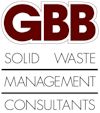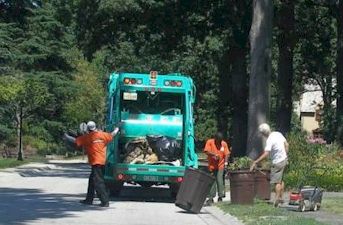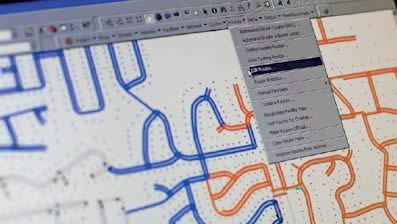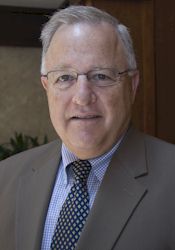|
New Ohio-based
Associates Enhance GBB’s Midwest Presence |
|
GBB is pleased to announce that
Michael D. Long, P.E. and Timothy D. Giardina have joined the firm as Principal
Associates. Based in Ohio, they will both enhance GBB’s Midwest presence and
contribute to projects throughout the country with their extensive hands-on
solid waste management background and expertise.
Michael
Long has 40 years of public service experience with
substantial expertise in waste reduction, recycling and the conversion of waste
to products, fuels and energy. For 18 years, he was Executive Director of the
Solid Waste Authority of Central Ohio. Previously, he served as the Director of
Public Utilities and Aviation for the City of Columbus, OH for more than 5
years. He also worked for the Ohio Department of Transportation in various
engineering and management capacities.
public service experience with
substantial expertise in waste reduction, recycling and the conversion of waste
to products, fuels and energy. For 18 years, he was Executive Director of the
Solid Waste Authority of Central Ohio. Previously, he served as the Director of
Public Utilities and Aviation for the City of Columbus, OH for more than 5
years. He also worked for the Ohio Department of Transportation in various
engineering and management capacities.
Timothy
Giardina has over 24 years of industry experience with a focus
on collection, transfer station, landfill, recycling and medical waste
operations. Prior to joining GBB, he spent 13 years with Waste Management Inc.
He previously held various positions for Browning-Ferris Industries in Maryland,
Pennsylvania and New Jersey.
years of industry experience with a focus
on collection, transfer station, landfill, recycling and medical waste
operations. Prior to joining GBB, he spent 13 years with Waste Management Inc.
He previously held various positions for Browning-Ferris Industries in Maryland,
Pennsylvania and New Jersey.
>>
Press
Release
>> Back to top |
|
|
Conferences |
|
GBB will be present at the following
industry events. We look forward to seeing you there!
Virginia Recycling
Association Conference
Virginia Beach, VA
May 18-19, 2010
Mary-Jane Atwater, Speaker
"When You Need Community Support: Making Informed Decisions Using
Low-Cost Research"
Harvey Gershman, Speaker
"Green-Ness Is Next To Godliness: Organics Diversion at a Religious
Institution"
Washington State Recycling Association Conference and Trade Show
Vancouver, WA
May 23-26, 2010
Booth # to be determined
Maryland Recycling Network / SWANA Mid-Atlantic Conference
Linthicum, MD
June 24-25, 2010
Booth # to be determined
Waste-to-Energy
Finance & Investment Summit
San Diego, CA
July 19-21, 2010
Harvey Gershman, Speaker
"Market Overview"
WASTECON
Boston, MA
August 15-17, 2010
Booth #2941
Bob Brickner, Speaker
"Saving 15% and Beating High Fuel Collection Costs- One contract better
than 12 for authority outside Detroit, MI"
Harvey Gershman, Speaker
"The Latest & Greatest on the Resurgence of WTE and Conversion
Technologies"
Visit the conference
/ tradeshow section of our Website for a continuously updated list
of events!
>> Back to top |
|
Contact |
|

Gershman, Brickner & Bratton, Inc.
8550 Arlington Boulevard,
Suite 304
Fairfax, VA
22031
Phone: 703.573.5800
Fax: 703.698.1306
Email:
gbb@gbbinc.com
www.gbbinc.com
|
|
For more
info about GBB:
www.gbbinc.com |
|
|
|
GBB and FleetRoute™
Assist City of Baltimore with Collection Re-Routing, Generating Significant
Savings of Up to $6 Million Per Year
New “One Plus One” Collection
Program Selected and Implemented |
|
 Using
FleetRoute™
route optimization software, GBB helped the City of Baltimore, MD to re-route
its residential trash collection system. The route optimization project, which
is expected to generate significant labor, fuel, equipment, and maintenance
savings, was provided through a contract with the Northeast Maryland Waste
Disposal Authority (NMWDA). For this project, GBB teamed with technology partner
C2Logix to provide the City with a unique combination of solid waste and route
optimization expertise. Using
FleetRoute™
route optimization software, GBB helped the City of Baltimore, MD to re-route
its residential trash collection system. The route optimization project, which
is expected to generate significant labor, fuel, equipment, and maintenance
savings, was provided through a contract with the Northeast Maryland Waste
Disposal Authority (NMWDA). For this project, GBB teamed with technology partner
C2Logix to provide the City with a unique combination of solid waste and route
optimization expertise.
The City has an estimated population of
630,000 with 190,000 households serviced by the Department of Public Works (DPW)
trucks and crews. Before the re-routing project, the DPW collected refuse twice
a week from each residence, with approximately 63 trucks operating six days a
week for a total of 214 routes.
 “In
2009, the GBB FleetRoute™
Service Bureau developed five alternative conceptual route scenarios. Each of
these optimized the routes, workdays, and equipment allocation, as well as
analyzed cost savings,” said Frank Bernheisel, GBB Vice President. “This
in-depth analysis provided the City with the necessary tools to make an informed
decision regarding changes in its collection operation and will allow for
significant collection cost reductions for the City while improving services to
residents with a more efficient operation.” “In
2009, the GBB FleetRoute™
Service Bureau developed five alternative conceptual route scenarios. Each of
these optimized the routes, workdays, and equipment allocation, as well as
analyzed cost savings,” said Frank Bernheisel, GBB Vice President. “This
in-depth analysis provided the City with the necessary tools to make an informed
decision regarding changes in its collection operation and will allow for
significant collection cost reductions for the City while improving services to
residents with a more efficient operation.”
 The
project included refining the geocoding of City customers on the GIS maps and
geocoding and identification of customers serviced in alleys. In addition, the
street centerline data were expanded to add alleys and travel attributes that
were not included in the City GIS baseline. City historical service data were
used for set-out weights, and field observations were conducted to update the
stop time information. The
project included refining the geocoding of City customers on the GIS maps and
geocoding and identification of customers serviced in alleys. In addition, the
street centerline data were expanded to add alleys and travel attributes that
were not included in the City GIS baseline. City historical service data were
used for set-out weights, and field observations were conducted to update the
stop time information.
The alternative conceptual route scenarios
were provided to NMWDA and the City, and included both weekly and twice-weekly
refuse collection. The weekly collection also included recycling collection,
referred to as One Plus One by the City. Scenarios included both five-day work
weeks and four-day work weeks. The analysis indicated that the change in the
collection system could save the City about $6 million a year. The City Council
approved the change, selected the One Plus One scenario, and the City began the
new collection program on July 13, 2009. The new program provides one trash
collection and one recycling collection each week for single-family residences
in Baltimore. The GBB Project Team developed the routes that were used in the
roll-out of the new One Plus One collection program.
Related
Web Links:
>>
Press Release
>>
FleetRoute Information
>> Back to top |
|
 |
|
Harvey Gershman
Comments on New York Times Article on WTE
NYT: Europe Finds Clean Energy in Trash, but U.S. Lags
|
|
 On
April 13, 2010, the New York Times published an article by Elisabeth Rosenthal
entitled “Europe
Finds Clean Energy in Trash, but U.S. Lags,” which confirms what many in the
solid waste industry have known for some time: Municipal solid waste is no
longer a nuisance when the technology exists—and is used—to extract energy and
raw materials on an industrial scale. On
April 13, 2010, the New York Times published an article by Elisabeth Rosenthal
entitled “Europe
Finds Clean Energy in Trash, but U.S. Lags,” which confirms what many in the
solid waste industry have known for some time: Municipal solid waste is no
longer a nuisance when the technology exists—and is used—to extract energy and
raw materials on an industrial scale.
Harvey Gershman, GBB President,
responded to the article with some additional facts and his comments on the
current state and future of Waste-To-Energy in the U.S.:
Elisabeth Rosenthal’s
article, “Europe
Finds Clean Energy in Trash, but U.S. Lags,” confirms what many of us in
the solid waste industry have known for some time: Municipal solid waste is
no longer a nuisance when the technology exists—and is used—to extract
energy and raw materials on an industrial scale.
At our company, we have
worked on more than 70 waste-to-energy projects, we have seen how today’s
waste-to-energy (WTE) facilities in the U. S. (some 89 in number) meet the
most stringent environmental standards in the world and serve as an
alternative to land disposal and power generation from fossil fuels,
preventing the release of tons of harmful nitrogen oxides and volatile
organic compounds. As noted by
Columbia University’s
Waste-to-Energy Research and Technology Council (see article entitled "Waste-to-Energy:
Renewable Energy Instead of Greenhouse Gas Emissions"), WTE allows for
energy and metals recovery, greenhouse gas reduction estimated
conservatively at one ton of CO2 per ton of municipal solid waste processed
by WTE rather than landfilled, and—important from the standpoint of
sustainable development—land conservation. Further, WTE has a “beautiful
friendship” with recycling, as the experience in many communities with WTE
demonstrates. Studies show that at the local level, communities that have
built WTE plants have an average recycling rate higher than the national
average. Yet even with the recycling and WTE that currently exists in the
U.S., over half of our waste stream is still buried in landfills.
While Ms. Rosenthal is
correct that no new WTE plants have been built in the U. S. in recent years,
she overlooked the fact that existing WTE facility expansions have occurred
or are underway in Hillsborough County, FL; Lee County, FL; Honolulu, HI;
Olmsted County, MN, and Baltimore, MD. New projects are in advanced
development for Frederick County, MD; Harford County, MD; Palm Beach County,
FL; and the U.S. Virgin Islands.
In the United States, we
need to manage our wastes better, including doing more to reduce the amount
of waste generated in the first place and boosting our recycling rate from
the 30 percent level. We can expand the types of plastics collected and
processed for recycling, we can do a better job of recycling away from home,
and we can add food waste to other organics we already compost. We need to
work collaboratively to establish national goals, such as recycling at least
50 percent of our waste, say by 2015, and then use the remaining waste for
its energy value while establishing economic incentives to encourage the
domestic use of both these waste-derived recyclable and energy resources.
Failure to act will result in a continuation of fragmented policies,
recycling plateaus, and too much waste transported and buried in landfills
that get farther away from where the waste is generated in the first place.
WTE needs to be in partnership with recycling so together recycling and WTE
can help get us much closer to sending “zero” waste to landfills.
Harvey W. Gershman,
President
Gershman, Bricker & Bratton, Inc.
Solid Waste Management Consultants
Related
Web Links:
>>
Harvey
Gershman's bio
>>
Selected GBB WTE Projects
>> Back to top |
|
Quality - Value - Ethics - Results
Turning
Your Challenges
Into
Success Stories! |
|